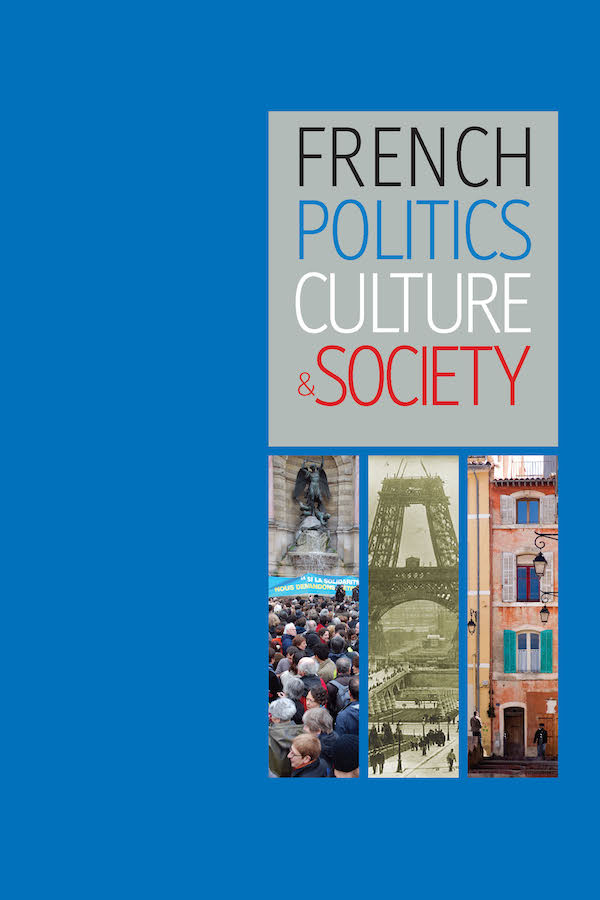
French Politics, Culture & Society
ISSN: 1537-6370 (print) • ISSN: 1558-5271 (online) • 3 issues per year
Executive Editor: Edward Berenson, New York University
Editor: Elisabeth Fink, New York University
Subjects: Contemporary French Studies, Politics, History, Sociology, Anthropology, Geography, Cultural Studies
The journal of the Conference Group on French Politics & Society. It is jointly sponsored by the Institute of French Studies at New York University and the Minda de Gunzburg Center for European Studies at Harvard University
![]() Available on JSTOR
Available on JSTOR
Latest Issue
Volume 43 Issue 1
Revivification, sportivisation et patrimonialisation d'une lutte traditionnelle
discours et revendications autour de la croche réunionnaise.
L'enquête exploratoire proposée s'appuie sur une approche anthropo-historique de la croche, un style de lutte de l’île de La Réunion. L'analyse discursive, principalement fondée sur des sources documentaires, des entretiens et quelques observations, étudie la trajectoire contemporaine de cette activité physique au regard de globalisation sportive. Ainsi, du fait d'une recréation avant tout exogène plutôt qu'endogène, la croche reste une activité en sursis patrimonial. Aujourd'hui, seule subsiste la réussite d'une normalisation sportive.
L'avenir radieux ?
Les premiers socialistes et l'ordre pratique des savoirs
The communitarian experiences of the first socialists condense a singular relationship to science. This article analyzes the place of practical knowledge—the knowledge of ordinary and daily experiences—in the socialist attempts to live together. During the nineteenth century academic sciences became more strongly structured while practical knowledge was considered less important or delegitimized. Four themes concerning the place of knowledge in community experiences are reviewed: everyday knowledge, hygiene, education and machines. In these four broad areas, early socialists made a subtle division between the use of academic science and the mobilization of practical knowledge. In everyday experiences, legitimate knowledge was required, but it did not. Practical knowledge thus did not disappear from the socio-epistemic horizon of the emancipatory current at the dawn of the nineteenth.
Les expériences communautaires des premiers socialistes condensent un rapport singulier à la science. Cet article analyse la place des savoirs pratiques - les savoirs de l'expérience ordinaire et quotidienne - dans les tentatives socialistes de vivre ensemble. Au cours du XIXe siècle, les sciences académiques se sont structurées de manière plus forte tandis que les savoirs pratiques ont été considérés comme moins importants ou délégitimés. Quatre thèmes concernant la place du savoir dans les expériences communautaires sont passés en revue : le savoir quotidien, l'hygiène, l’éducation et les machines. Dans ces quatre grands domaines, les premiers socialistes ont établi une distinction subtile entre l'utilisation des sciences académiques et la mobilisation des connaissances pratiques. Dans les expériences quotidiennes, le savoir légitime était nécessaire, mais il ne l’était pas. Le savoir pratique n'a donc pas disparu de l'horizon socio-épistémique du courant émancipateur à l'aube du XIXe siècle.
Freezing in the Shadow of America
French Frozen-Food Professionals and American Innovation in the 1960s
Using articles published during the 1960s in the frozen-food trade journal
Fragile Hands and the True Life
Robert Linhart and L’Établi , Then and Now
Robert Linhart was a leader of the French Maoists and an analyst of Lenin's theory and practice during the 1968 years. He is best known for his account of working in a French automobile factory in 1968–1969,
Blanchot Collabo
From the Jeune Droite to Jeune France
Maurice Blanchot (1907–2003) was best known for his pathbreaking forays in literary criticism: dense meditations on the abyss of literary meaning, culminating in his radical insight concerning the ontological impossibility of writing or écriture. Accordingly, Blanchot was justly canonized by luminaries of French Theory such as Roland Barthes, Michel Foucault, and Jacques Derrida as an indispensable precursor of their influential prognostications concerning la mort de l'auteur and le degré zéro l’écriture. At the same time, circa 1980, rumors began to circulate concerning what Michel Surya has denominated l'autre Blanchot: the right-wing political journalist of the 1930s, who enthusiastically embraced the neo-Maurrassian adage, Plutôt Hitler que Blum. Could it be that one of the reasons that, later in life, Blanchot was attracted to such hermetic theories of textuality and signification—écriture blanche—was to escape the trammels of his ignominious political past?
Book Reviews
John Shovlin,
Caroline Séquin,
Willa Z. Silverman,